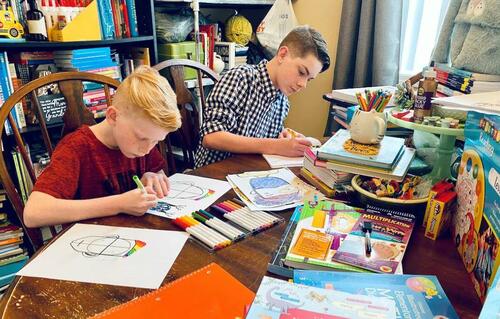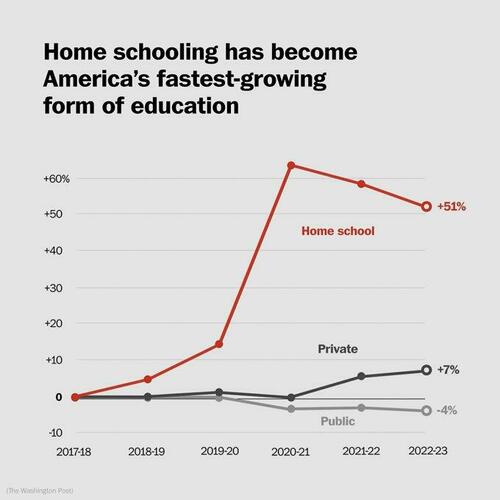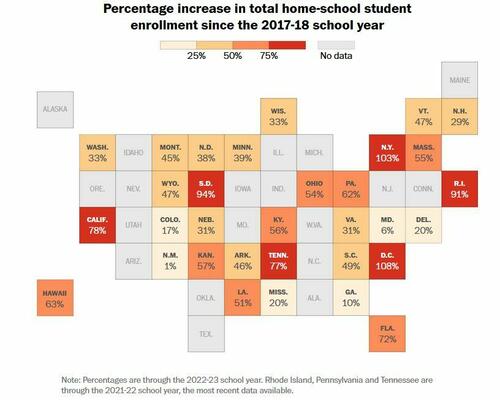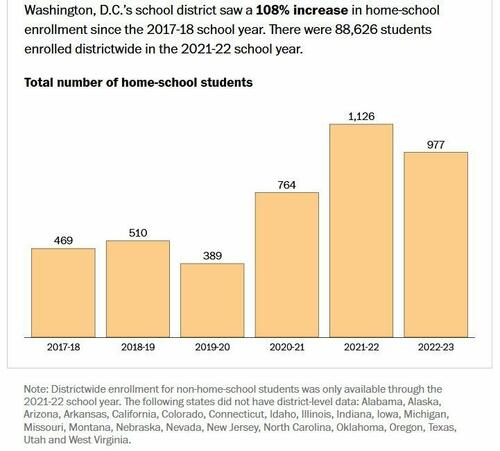In the ever-evolving landscape of American education, a quiet revolution is taking place. Over the past six years, home schooling has surged by 51% - in stark contrast to the 7% rise in private school enrollment, and a 4% dip in public schools over the same period, according to an in-depth look by the Washington Post at thousands of school districts spanning 32 states which provide accurate data.
Once limited to the peripheries of mainstream education, home schooling is rapidly emerging as a force to be reckoned with. Between the Covid lockdowns, pissed-off conservative parents who don't want their children indoctrinated by mentally ill activists.
The pandemic, with its sweeping disruptions to conventional schooling, undoubtedly served as a catalyst for this seismic shift. Schools across the country shuttered, forcing millions of families to grapple with remote learning and rethink the entire educational paradigm. Yet, as the pandemic wanes and schools reopen, shedding many of their COVID-19 constraints, the surge in home schooling has not only persisted but flourished.
"This is a fundamental change of life, and it’s astonishing that it’s so persistent," according to Nat Malkus, a senior fellow and deputy director of education policy at the American Enterprise Institute, a conservative-leaning think tank.
This trend isn't confined to specific regions or demographics; from the bustling streets of Upper Manhattan to the tranquil landscapes of Eastern Kentucky, families are increasingly opting to take the educational reins into their own hands.
The personal costs to home schooling are more than just tuition," Malkus said. "They are a restructuring of the way your family works."
The most home-schooled students live in Florida, which has 154,000 of them, while several states have seen growth exceeding 75% in the 2017-2018 school year.
While the Washington DC has seen the most state-wide growth, New York City takes the cake at the city-level.
In 24 of the city’s 33 school districts, home-schooled children increased by at least 200 percent over six years. The largest growth was seen in Brooklyn and in the Bronx, where some districts exceeded 300 percent growth.
Afua Brown, who lives in Harlem, pulled her daughter out of a public elementary school in 2015 after she was bullied in kindergarten. Private school was too expensive, so Brown tried her hand at home education for her daughter and younger son.
She eventually became a leader in the New York City Home Educators Alliance, where she watched the local home-school community expand dramatically. But while their ranks can feel large at the organization’s science fairs, picnics and ice skating days, Brown recognizes home-schoolers are still a tiny fraction of the city’s school-age kids. Her children were among 377 in the fall of 2022 in a school district, including Manhattan’s Upper West Side and part of Harlem, where public enrollment is close to 20,000. -WaPo
The data dismantles several preconceived notions about home schooling. First and foremost, the boom isn’t a mere reaction to failing public schools. The Post found no substantial correlation between a district's quality, as determined by standardized test scores, and its growth in home schooling. Surprisingly, even districts that consistently score high on standardized tests have seen spikes in home schooling.
Implications
The rise of home schooling is reshaping the very fabric of American education. On one hand, it empowers parents, offering them the autonomy to tailor their children's education. On the other, it poses challenges for the public education system, which relies on funding based on student enrollment.
"If [home-schooled] students are not enrolled in our district, we are not getting funding for them," said Krystal Goode, a high school social studies teacher and head of the Pulaski County Education Association.
Furthermore, the lack of oversight and regulation in many states raises questions about the quality and consistency of education received by home-schooled students. Without standardized tests or curriculum guidelines, ensuring that students receive a comprehensive education falls squarely on the shoulders of parents.

"I can tell you right now: Many of these parents don’t have any understanding of education," said Hillsborough County School Board member Lynn Gray. "The price will be very big to us, and to society. But that won’t show up for a few years."
While it's clear that home schooling has cemented its place in the American educational system, its trajectory remains to be seen. Will it continue its upward trend, further buoyed by policies and societal shifts? Or will it stabilize, finding its niche alongside public and private schools?
Meanwhile, WaPo's report comes as Portland, Oregon teachers begin a district-wide strike, shuttering schools for more than 45,000 students. Home Schooling FTW.



No comments:
Post a Comment
Note: Only a member of this blog may post a comment.